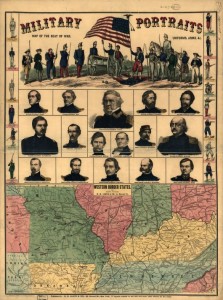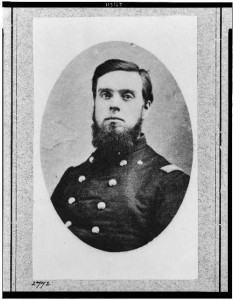I’m not sure how true the following letter is; from a Southern perspective, it’s not bad propaganda. Yankees are still thieves and their will for war might be faltering – “Officers are resigning every week.” The Yankees seem to be living high on the southern hog. The surgeon is well-fed and has time to make repeated trips to the photography studio to get just the right portrait for his family. The only shortage seems to be of postage stamps.
From the Richmond Daily Dispatch May 15, 1863:
Yankee life in the South.
–Among some letters recently captured by our cavalry in Tennessee, is one from a Yankee Surgeon– Capt. J. N. Groves, of the 98th Illinois regiment. He is writing to “Dear Regina,” his wife. He says:
We have just returned from a grand thieving expedition; some may call it a scouting party but the most appropriate name is the former. We captured about a thousand horses, five hundred negroes, and two hundred prisoners. It was the first trip I had been on of the kind. We would go to the field where the negroes were plowing and make them unharness and get on the horses and strike out; enter the smoke houses and take all the house we could carry, and then burn the rest. The women would cry and beg, but to no purpose.–One of our men was shot, and Dr. Vertress and I amputated his leg, at a Mr. Anderson’s. We took all his horses but one. This belonged to a young lady, who gave me the mare, and told me she would sooner make me a present of her than to let the soldiers steal her. I have got her; she is the finest animated ever saw. –I could talk about incidents for a month that happened on this trip, but I will refrain. I have got a very fine silk dress for you and Nelly. I will send them as soon as possible.–The black one is for you and the green one for Nelly. Your dress pattern is worth thirty dollars; and also a fine scarf, red; you may do as you please with it. I do not know what the latter is for. Tom Cox, the man that took the coffee, stole the silks and gave them to me.–He run out of money going home and sold the coffee. I have got a shot gun for Walter; a nice carbine that will shoot a thousand yards for your father. If I get a chance I will send them home. Officers are resigning every week. I will send your dresses next week by Capt. Cox; he will express them from Olney. I am not caring whether I get home or not; I could only stay there a few weeks if I were to go, and it will not cost any more for you to come to see me than for me to go and see you. Get your clothing made and when you are ready to come let me know, I want you to travel some, and this will be a nice trip. Whenever you see Col. Winders [Wilder’s] mounted brigade mentioned look out for breakers; they run the rebels into the mountains and catch them. It is the brigade that the bloody 98th belongs to. I love to go on these wild trips, but it is not often that I get the privilege of going. I have not received any word from your mother for a long time. I have gone up to the gallery to have my picture taken twice, and did not get one to suit me. I will not send one until it suits me; you don’t want an ugly picture. You can’t guess what we had for dinner. Eggs, biscuit, butter, ham, potatoes, molasses, pies, peaches and blackberries, and other articles too tedious to mention. I wish you would send me some stamps, they are very scarce here. I hope you have got that money by this time.–Answer soon, your affectionate husband.
For at least part of 1863 the 98th Illinois Volunteer Infantry Regiment was indeed a unit in “Wilder’s Mounted Infantry.” John Thomas Wilder enlisted as a private in an Indiana regiment in 1861 and quickly moved up the ranks. In September 1862 Wilder surrendered the Union garrison at Munfordville, Kentucky to Simon Buckner’s Confederates. Two months later he was released:
When Wilder returned to his command at the end of 1862, it was clear that his stint in captivity had done little to diminish his audacity. In March of 1863, after his troops unanimously voted to adopt the Spencer repeating rifle, the colonel once again displayed his penchant for innovation—and his complete disregard for army red tape—by taking it upon himself to rearm his entire brigade with private funds loaned from Indiana bankers. At the same time, Wilder received permission to raid the Tennessee countryside for horses in order to reorganize his outfit as mounted infantry. Armed with state-of-the-art weapons and, now, mounted, Wilder’s four regiments became an integral instrument in the Army of the Cumberland’s 1863 campaigns, often on detached missions or in advance of the army.
Later in Wilder’s long life he “was commissioner of the Chickamauga and Chattanooga National Military Park.”


